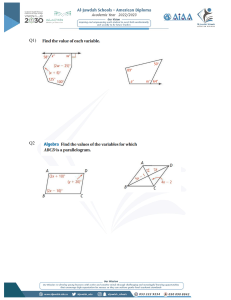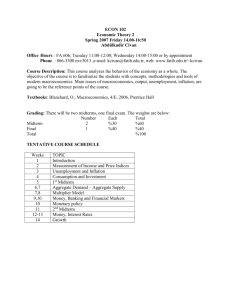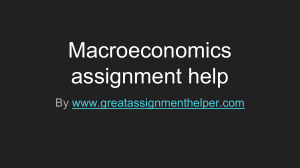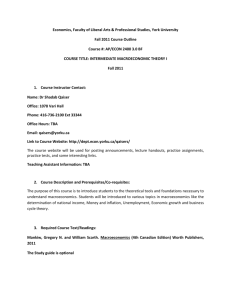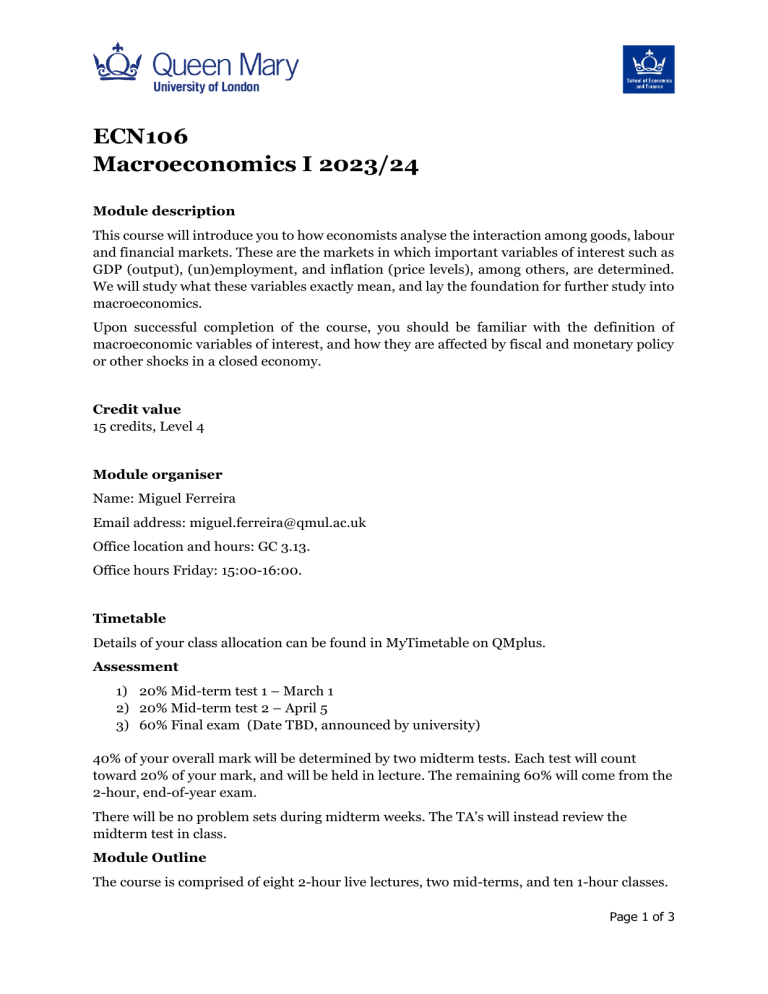
ECN106 Macroeconomics I 2023/24 Module description This course will introduce you to how economists analyse the interaction among goods, labour and financial markets. These are the markets in which important variables of interest such as GDP (output), (un)employment, and inflation (price levels), among others, are determined. We will study what these variables exactly mean, and lay the foundation for further study into macroeconomics. Upon successful completion of the course, you should be familiar with the definition of macroeconomic variables of interest, and how they are affected by fiscal and monetary policy or other shocks in a closed economy. Credit value 15 credits, Level 4 Module organiser Name: Miguel Ferreira Email address: miguel.ferreira@qmul.ac.uk Office location and hours: GC 3.13. Office hours Friday: 15:00-16:00. Timetable Details of your class allocation can be found in MyTimetable on QMplus. Assessment 1) 20% Mid-term test 1 – March 1 2) 20% Mid-term test 2 – April 5 3) 60% Final exam (Date TBD, announced by university) 40% of your overall mark will be determined by two midterm tests. Each test will count toward 20% of your mark, and will be held in lecture. The remaining 60% will come from the 2-hour, end-of-year exam. There will be no problem sets during midterm weeks. The TA’s will instead review the midterm test in class. Module Outline The course is comprised of eight 2-hour live lectures, two mid-terms, and ten 1-hour classes. Page 1 of 3 Weekly lecture slides will be made available online at least a week in advance of the lectures on Fridays. The slides are more or less self-contained, but I encourage you to refer to the textbook as well (but textbook reading is not compulsory). Classes are compulsory and essential for your learning. Their main purpose is to discuss the solutions to weekly problem sets which will be based on the previous week's lecture. The problem sets will be available online every Friday evening (starting from the first week of the semester). Students should answer the questions in advance and attend their allocated classes to understand the solutions. For any questions regarding the course, you can sign up for office hours as indicated above in item 2. For problem set related questions, you are encouraged to first visit the teaching assistants (TA) during their office hours. Module Material The official textbooks for the course are 1- Macroeconomics, 9th edition - Mankiw, N. Gregory 2- Macroeconomics, International edition, 5th edition - Jones, Charles I. Lecture slides are compulsory material Schedule of the Module We will try to stick to the schedule, but small adjustments will be made throughout the semester depending on how quick/slow we proceed. 1. 26 Jan: (M) Ch. 1-2, (LS) 1 (J) Ch. 1-2 - What is macroeconomics? What should we care about and why? How do we analyze macroeconomic phenomena? - Looking at data, short- vs long-run, stocks vs flows. 2. 2 Feb: (M) Ch 3.1-3.2, 7.1 (LS) 2 (J) Ch. 4.1-4.3, 7.1-7.5 - What determines output in the long-run? - Unemployment and wage rigidity 3. 9 Feb: (M) Ch 3.3-3.4, (LS) 3, (J) Ch. 4.3 - What determines the demand for goods and services? - Goods market equilibrium, consumption, savings and invesmtent 4. 16 Feb: (M) Ch. 4, (LS) 4 (J) Ch.8, 10.4 - What is money? What do banks do? 5. 23 Feb: (M) Ch. 5.1, 5.3-5.4, 10.3, 11.2, (LS) 5 (J) Ch.8, 10.4 - Money market equilibrium and inflation 6. 1 Mar : MIDTERM TEST 1 Page 2 of 3 8 Mar: Reading Week 7. 15 Mar: (LS) 6 (J) Ch.11.1-11.4 - Keynesian equilibrium and fiscal policy in the short-run - Money market equilibrium and monetary policy in the short-run 8. 22 Mar: (LS) 7 (J) Ch. 12 - The IS-MP model and fiscal policy - Central bank’s policy in IS-MP 9. 5 Apr : MIDTERM TEST 2 10. 12 Apr: (LS) 8 (J) Ch.12, 13.1-13.3 - IS-MP as a model of short-run aggregate demand - Shocks, short- vs long-run adjustment, and stabilization policies END-OF-YEAR FINAL EXAM (DATE TBD) - During the exam period, office hours will be held by request. Further information This module follows the policies of the School of Economics and Finance, as described in the Undergraduate Handbook 2023–24. The School’s administrative office is in room GC306, and email enquiries should be directed to the UG student support inbox [ugsefsupport@qmul.ac.uk]. Student conduct In order to ensure a positive learning environment, all students are expected to comply with the SEF Code of Conduct and the QMUL Code of Student Discipline. Details of these policies can be found in the UG Info Zone on QMplus. Page 3 of 3
